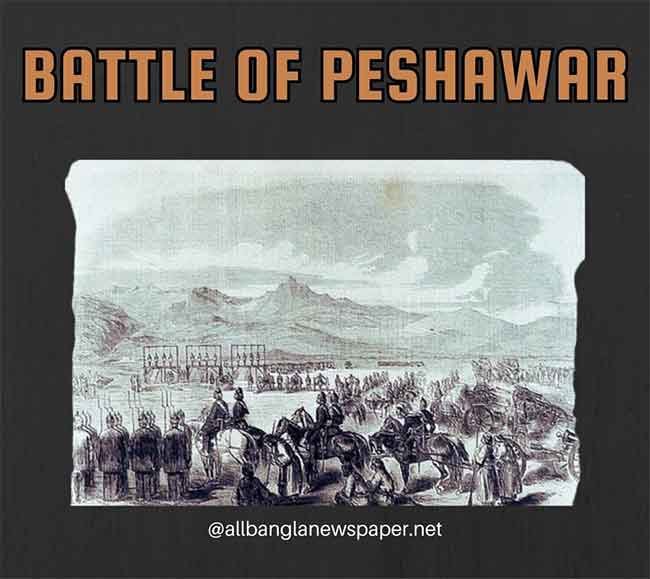
The Battle of Peshawar fought in 1834, was a pivotal event in the historical narrative of South Asia. This battle encapsulated the political ambitions, military strategies, and cultural tensions that defined the region during the early 19th century. It marked the confrontation between the forces of the Sikh Empire, led by Maharaja Ranjit Singh, and the Kingdom of Afghanistan, under the leadership of Emir Dost Mohammad Khan. This battle not only reshaped territorial boundaries but also cemented the legacies of the leaders and soldiers who participated in it.

Historical Context of the Battle of Peshawar
The early 19th century was a tumultuous period in South Asia. The decline of the Mughal Empire had left a power vacuum, prompting regional powers like the Sikh Empire and the Durrani Dynasty of Afghanistan to vie for supremacy. Peshawar, situated at the crossroads of South and Central Asia, was a strategically vital city. Its location made it a coveted prize for regional powers seeking to expand their influence.
The Role of the Sikh Empire
Under the visionary leadership of Maharaja Ranjit Singh, the Sikh Empire rose to prominence as a formidable force in northern India. Ranjit Singh sought to consolidate his territory by securing key regions like Peshawar, which was under the Afghans' control.
The Afghan Perspective
On the other hand, Emir Dost Mohammad Khan, determined to preserve Afghan sovereignty, saw the Sikh expansion as a threat to his kingdom. Peshawar's fall to the Sikh Empire in 1834 was not only a strategic loss but also a blow to Afghan pride and territorial integrity.
The Prelude to Battle
The seeds of the Battle of Peshawar were sown years before the actual conflict. In 1823, the Sikhs under General Hari Singh Nalwa had already captured Peshawar after defeating the Afghans in the Battle of Nowshera. However, Afghan forces repeatedly attempted to reclaim the city, leading to a series of skirmishes and heightened tensions between the two powers.
Maharaja Ranjit Singh's decision to formally annex Peshawar into the Sikh Empire in 1834 escalated these tensions into an open conflict. The move was seen as a direct challenge to Afghan authority, forcing Dost Mohammad Khan to rally his forces for a decisive confrontation.
The Battle and its Key Figures
The Battle of Peshawar in 1834 brought some of the most iconic figures of the era to the forefront.
Hari Singh Nalwa The Lion of Punjab
The legendary Sikh general Hari Singh Nalwa played a critical role in the battle. Renowned for his bravery and military acumen, Nalwa was instrumental in securing the northwestern frontier for the Sikh Empire. His leadership and battlefield tactics during the Battle of Peshawar demonstrated his unwavering commitment to Maharaja Ranjit Singh's vision.
Dost Mohammad Khan, The Afghan Defender
On the opposing side, Dost Mohammad Khan emerged as a determined leader fighting to protect his kingdom. Despite the eventual loss, his resilience in the face of adversity inspired future generations of Afghans.
The Clash of Armies
The Sikh army, equipped with modern weaponry and artillery, faced fierce resistance from the Afghan forces. However, the Sikh Empire's superior organization and strategic planning ultimately secured their victory. The battle ended with the formal annexation of Peshawar into the Sikh Empire, a move that would have lasting implications for the region.
Impact of the Battle on South Asian History
The Battle of Peshawar was not just a military confrontation—it was a turning point in the political and cultural landscape of South Asia.
Strategic Significance
By capturing Peshawar, the capital of the Sikh Empire, she gained control over a critical trade and military hub. This victory not only strengthened Ranjit Singh's hold over the northwestern frontier but also curtailed Afghan influence in the region.
Cultural Ramifications
The battle highlighted the interplay of diverse cultures and religions in South Asia. Peshawar, with its rich history as a melting pot of civilizations, became a symbol of the Sikh Empire's inclusivity and resilience.
The Legacy of the Battle of Peshawar
The Battle of Peshawar left an indelible mark on South Asia's history. It showcased the strategic brilliance of leaders like Maharaja Ranjit Singh and Hari Singh Nalwa, whose efforts ensured the Sikh Empire's dominance in the region.
Hari Singh Nalwa's Contributions
Nalwa's role in securing Peshawar earned him the title of "Lion of Punjab." His contributions extended beyond the battlefield, as he implemented administrative reforms that strengthened the Sikh Empire's hold on the region.
Dost Mohammad Khan's Resilience
While the Afghans lost the battle, Dost Mohammad Khan's leadership during this turbulent period remains a source of pride for Afghanistan. His efforts to protect Afghan sovereignty against external threats are celebrated as a testament to his bravery.
Broader Implications for South Asia
The Battle of Peshawar was part of a larger narrative of power struggles in South Asia during the 19th century. The conflict underscored the importance of strategic alliances, military innovation, and effective leadership in shaping the region's history.
It also paved the way for future geopolitical shifts, as the decline of the Sikh Empire and the rise of British colonial rule would further alter the balance of power in South Asia.
The Legacy and Bravery of Tipu Sultan: A Historical Icon
While the Battle of Peshawar is a testament to the courage of the Sikh and Afghan forces, it is worth remembering the legacy of other historical figures who fought for sovereignty and justice. "The Legacy and Bravery of Tipu Sultan a Historical Icon" reminds us of the enduring spirit of resistance against oppression, much like the events surrounding Peshawar's capture.
External References to Broaden Perspectives
To better understand the Battle of Peshawar's historical significance, one can explore South Asian History at Columbia for a detailed analysis of the region's power dynamics. Similarly, the World History Encyclopedia offers valuable insights into the cultural and geopolitical factors influencing 19th-century South Asia.
The Battle of Peshawar stands as a defining moment in South Asian history, symbolizing the clash of empires, cultures, and ideologies. It was a testament to the resilience and strategic brilliance of leaders like Maharaja Ranjit Singh, Hari Singh Nalwa, and Dost Mohammad Khan. This battle's legacy continues to inspire historians, military strategists, and those fascinated by South Asia's rich history. As we reflect on this pivotal event, we recognize its enduring impact on the political and cultural fabric of the region.
#BattleOfPeshawar #SouthAsianHistory #SikhEmpire



